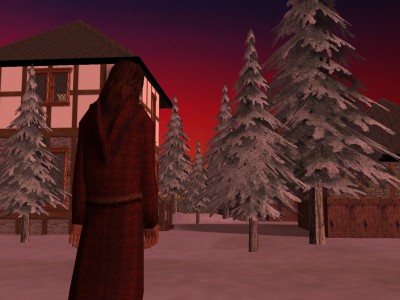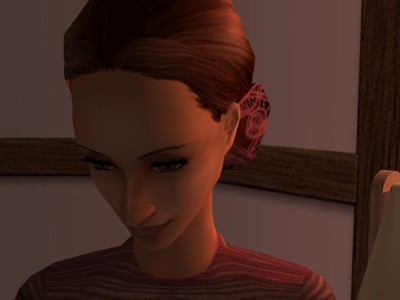
Ethelmund Ashdown turned into his gate and plodded up the path towards the new house. The snow that had fallen all afternoon creaked now beneath the weight of his feet, and the branches of the pines creaked beneath the weight of the snow, and his knees and elbows and spine creaked beneath the weight of the work he had been doing these past weeks.
He had built humble little coffins until he had no more scrap wood, and then he had used up the finer planks, and then he had begun building coffins out of green pine. It was grim work, and it earned him less than what it cost. Nor did Githa understand, but he would not have a single baby laid naked in the cold earth this winter, even if their parents could only repay him with their gratitude.

In any case, there was nearly nothing else for him to do. People who could not afford to feed their children did not buy furniture.
Only the King still had work for him, for the building at the castle proceeded at a furious pace in spite of the weather. Ethelmund thought it was as much to keep the men employed and to give the King an excuse to feed their families without it seeming charity as it was to extend the castle.
Ethelmund himself certainly understood that – the King little realized how much of what Ethelmund earned with his woodwork went into the bellies of the children of his farmhands.
Nor did Githa, Ethelmund thought ruefully. But Githa would not understand.

Ethelmund laid his hand on the knob and stopped. The iron was cold and burned his hand, but he had to take a moment to collect himself. The walk had not been enough. Should he tell Githa, first of all? And, more importantly, what would he find when he opened the door?
When he opened the door, he found a front hall cold and dark. Supper was not laid. This was a bad sign. But light and warmth came from the back hall, and so he removed his cloak and went to see.
It was only Colburga.
“Hallo, sweetheart. Where’s your mother?” he asked her.

She jumped up and ran to give him a hug. “Mother is upstairs with the babies. She said she doesn’t want supper, but there’s a soup on the fire in the kitchen, and old Ana brought some good bread.”
“Have you eaten?”
“I was waiting for you.”
“Well, let me look in on your mother and the babies first,” he said.

He stroked back her hair and smiled fondly and sadly down on this daughter of his youth. Only she would remember the years at the old house, where they had all lived and slept in a single room, and had but one fire for their cooking and warmth and light. How crowded and cozy it had been, with all of the children, and how happy!
And now they had a fine, great house with several rooms and several fires, and it seemed so empty, and it would soon be emptier, he knew.
He found Githa in the little room that the boys shared, pacing from wall to wall in the dying winter light. Cenwulf lay limp in her arms, and he could see at once that the baby had worsened. His eyes were dark and sunken, and his thin lips were slack and dry.

He had seen many such babies in the last days, on the first occasion of delivering a coffin to a little house. When he saw them thus, he knew that he would soon be returning to deliver another.
Githa stopped pacing when he came in and looked wearily up at him, as from a great depth. Her eyes too had a dying look to them.
He did not dare ask how they were, and so he asked her, “How are you?”
“Would you like to hold him a while?” she asked dully.
“If you will go and have a bite to eat with Colburga.”
“I’m not hungry.”

“Eat anyway.”
“There will be time enough for eating later.”
Eadgard pulled himself up to look over the edge of his cradle. “Papa?”
“Here’s my boy,” Ethelmund said as he picked him up. It was only beginning in him – his flushed cheeks were still fat, his skin was damp, and his eyes were bright.
“Did you go by the Hogge farm?” Githa asked suddenly.

Ethelmund winced. Immediately upon seeing her and the babies he had decided he wouldn’t tell her. He hadn’t planned on her asking. But it would do no good to lie to her now. She would learn the truth one day, and would not forgive him for trying to spare her.
“I was there on my way home,” he said softly, avoiding her eyes. “Little Angnes is gone.”
She said nothing, but when he dared to look at her she seemed to be that much smaller, and he could almost hear her body creaking beneath the weight of it all.






Add Comment